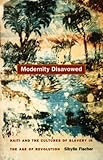Modernity disavowed : Haiti and the cultures of slavery in the age of revolution / Sibylle Fischer.
Material type: TextSeries: A John Hope Franklin Center bookPublication details: Durham : Duke University Press, 2004.Description: xiii, 364 p. : ill., maps ; 23 cmISBN:
TextSeries: A John Hope Franklin Center bookPublication details: Durham : Duke University Press, 2004.Description: xiii, 364 p. : ill., maps ; 23 cmISBN: - 0822332523 (cloth : alk. paper)
- 9780822332527 (cloth : alk. paper)
- 0822332906 (pbk. : alk. paper)
- 9780822332909 (pbk. : alk. paper)
- Haiti -- History -- Revolution, 1791-1804 -- Literature and the revolution
- Slave insurrections
- Blacks -- Cuba -- History
- Blacks -- Dominican Republic -- History
- Literature and history
- Slavery in literature
- Franse Revolutie
- Slavernij
- Râevoltes d'esclaves
- Noirs -- Cuba -- Histoire
- Noirs -- Râepublique dominicaine -- Histoire
- Littâerature et histoire
- Esclavage dans la littâerature
- Haèiti -- Histoire -- 1791-1804 (Râevolution) -- Littâerature et râevolution
- Geschichte 1791-1804
- Sklaverei
- Unabhèangigkeitskrieg
- Haiti
- 972.94/03
- 110 F 1923 F529m 2004
| Item type | Current library | Home library | Collection | Shelving location | Call number | Vol info | Copy number | Status | Date due | Barcode |
|---|---|---|---|---|---|---|---|---|---|---|
 Libro
Libro
|
Biblioteca Juan Bosch | Biblioteca Juan Bosch | Recursos Regionales | Recursos Regionales (2do. Piso) | 110 F 1923 F529m 2004 (Browse shelf(Opens below)) | 1 | 1 | Available | 00000078125 |
"A John Hope Franklin Center book."
Includes bibliographical references (p. [287]-354) and index.
Truncations of modernity -- The deadly hermeneutics of the trial of Josâe Antonio Aponte -- Civilization and barbarism : Cuban wall painting -- Beyond national culture, the abject : the case of Plâacido -- Cuban antislavery narratives and the origins of literary discourse -- Memory, trauma, history -- Guilt and betrayal in Santo Domingo -- What do the Haitians want? -- Fictions of literary history -- Literature and the theater of revolution --
"General liberty or The planters in Paris" -- Foundational fictions : postrevolutionary constitutions I -- Life in the kingdom of the north -- Liberty and reason of state : postrevolutionary constitutions II.
Also issued online.
Modernity Disavowed is a pathbreaking study of the cultural, political, and philosophical significance of the Haitian Revolution (1791-1804). Revealing how the radical antislavery politics of this seminal event have been suppressed and ignored in historical and cultural records over the past two hundred years, Sibylle Fischer contends that revolutionary antislavery and its subsequent disavowal are central to the formation and understanding of Western modernity. She develops a powerful argument that the denial of revolutionary antislavery eventually became a crucial ingredient in a range of hegemonic thought, including Creole nationalism in the Caribbean and G. W. F. Hegel's master-slave dialectic. Fischer draws on history, literary scholarship, political theory, philosophy, and psychoanalytic theory to examine a range of material, including Haitian political and legal documents and nineteenth-century Cuban and Dominican literature and art. She demonstrates that at a time when racial taxonomies were beginning to mutate into scientific racism and racist biology, the Haitian revolutionaries recognized the question of race as political. Yet, as the cultural records of neighboring Cuba and the Dominican Republic show, the story of the Haitian Revolution has been told as one outside politics and beyond human language, as a tale of barbarism and unspeakable violence. From the time of the revolution onward, the story has been confined to the margins of history: to rumors, oral histories, and confidential letters. Fischer maintains that without accounting for revolutionary antislavery and its subsequent disavowal, Western modernity - including its hierarchy of values, depoliticization of social goals having to do with racial differences, and privileging of claims of national sovereignty - cannot be fully understood.


There are no comments on this title.